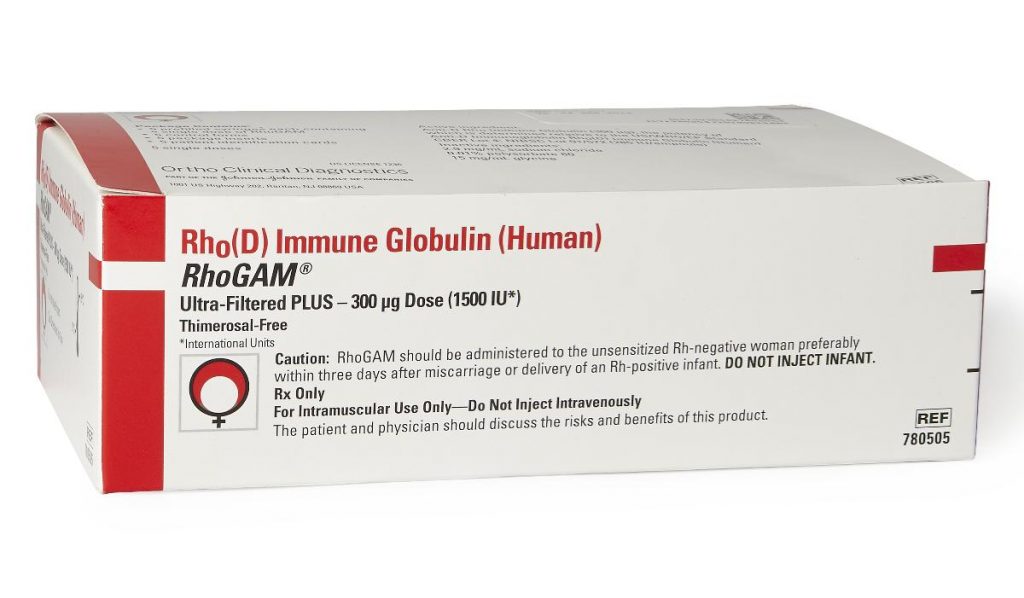RhoGAM; What You Should Know including Cost in Lagos, Abuja, Enugu, Port Harcourt, Kaduna.
Generic Name: RHo (D) immune globulin
What is RhoGAM
RHo (D) immune globulin (RhoGAM) is a sterilized solution containing IgG anti-D (anti-Rh) obtained from human blood.
It is a medication used to prevent Rh isoimmunization in mothers who are Rh negative. Rh is a substance that occurs naturally in the blood of most people.
Such group are said to be Rh positive.
But in some people, Rh is absent (Rh negative). Rh is the abbreviation for rhesus, which is the name of one of many different blood group systems in the body. Rh-positive people have the Rh antigen (also called rhesus factor or D antigen) on the surface of their red blood cells Rh-negative people do not have the Rh antigen on the surface of their red blood cells.
When a Rh negative mother is pregnant with a Rhesus positive child, the mother’s Rh negative blood sees the Rh positive child blood as a foreign body, thereby producing antibodies against it.
Rhesus incompatibility can be a cause of recurrent miscarriages and intrauterine fetal death in some women.
How does it work?
RhoGAM is an immune globulin used to prevent an immune response by the Rh negative mother to the Rh positive child.
It helps prevent the production of antibodies (Rh-sensitization). Rh-sensitization of the mother during pregnancy can lead to hemolytic disease of the fetus and newborn (HDFN) in future pregnancies.
When administered, it prevents the Rh-negative expectant mother from making antibodies during pregnancy that could cause HDFN in future pregnancies.
When to use RhoGAM
RhoGAM is indicated for the prevention of Rh-sensitization in the following situations:
- During pregnancy in Rh-negative women unless the father or baby are proven to be Rh-negative
- In cases of suspected or proven fetal-maternal hemorrhage during pregnancy (instances in which the baby’s blood enters the mother’s bloodstream)
- Actual or threatened pregnancy loss at any stage of pregnancy
- Ectopic pregnancy/ruptured ectopic pregnancy
- Miscarriage/abortion
- Prenatal testing like Chorionic Villus Sampling(CVS), amniocentesis, fetal blood sampling, cordocentesis, and fetal biopsy.
- In any Rh-negative person after the incompatible transfusion of Rh-positive blood or blood products
Other indications include:
_ Immune thrombocytopenia purpurea (Nonsplenectomized Rh0(D)-Positive patients)
_Incompatible transfusion
How is it given?
It is administered as intravenous (I.V) or intramuscular (I.M) injection.
To prevent immune response leading to hemolytic disease in fetus and newborn, RhoGAM is administered;
Antepartum(during pregnancy): 1500 IU at 28 – 30 weeks of gestation.
Postpartum(after delivery): 1500 IU within 72 hours of delivery. If unable to administer within 72 hours, givewithin 28 days.
Administering both antepartum and postpartum doses reduces the risk of immune responses by over 97 percent.
In obstetric conditions such as miscarriage or abortion involving a Rh negative woman and Rhesus positive fetus, RhoGAM should be administered at a dose of 1500 IU within 72 hours.
Side effects of RhoGAM
Most common are:
# Injection site reactions that include swelling, induration, redness and mild pain or warmth.
#Systemic reactions that include nausea, diarrhea, vomiting, stomach pain, skin rash, body
aches or a slight elevation in temperature, flushing (warmth, redness, or tingly feeling).
Patients should be observed for at least 20 minutes after administration. Severe systemic allergic reactions are extremely rare.
Who should not use RhoGAM
- People known to be hypersensitive to immune globulins
- Rh positive women
- Rh negative women who are Rh immunized
- Newborn
RhoGAM should be administered only in a healthcare facility under the supervision of medical expert where laboratory and other monitoring can be done.
Cost and where to get RhoGAM
Availability, accessibility and affordability are crucial aspects of pharmacotherapy.
RhoGAM is available in every state in Nigeria in health facilities including Government tertiary hospitals, some private specialist hospitals and some community pharmacies.
The cost of RhoGAM vary slightly from one facility to the other.
Drug revolving fund, national health insurance scheme, brand of the drug, are some of the factors that affect the cost of the drug.
Some facilities you are sure to get RhoGAM and price include;
- University of Benin Teaching Hospital, Benin City, Edo State N45, 400
- Airen Pharmacy, Sapele Road, Benin-city~ N47,000
- Flowell Pharmacy, Sapele Road, Benin-city~ N47,000
- Overflow Pharmacy, Hospital Road, Tori, Warri, Delta state~ N49,000
- Irrua Specialist Teaching Hospital, Irrua, Edo State N43, 300
- Nnamdi Azikiwe University Teaching Hospital, Nnewi, Anambra State- N26,500
- Georgie Pharmacy, ZIK Avenue, Awka, Anambra State N50, 000
- University College Hospital, Ibadan, Oyo State N43, 600
- KLEN Pharmacy, Utako, Abuja N38, 000
- PRIME Pharmacy, Area 11, Garki, Abuja N37, 000
- Alpha Pharmacy in Ikeja, Lagos State~ N47,500
- Dangi Pharmacy, Gyadi Gyadi, Kano~ N35,000
- Maneks Pharmacy, 8, Kakuri Bus Stop, By Makera Road, Kakuri, Kaduna South~N46,500

Credit: pharm.com.ng
Written by AIGBAGENODE Aiyebor Augustine (B.Pharm, Pharm.D)
Public Health Pharmacist





















